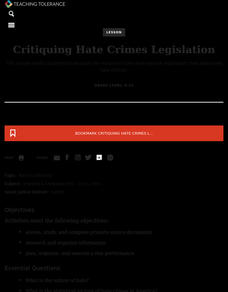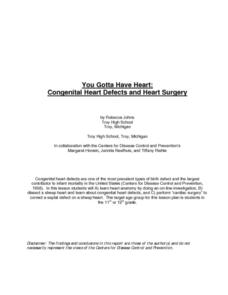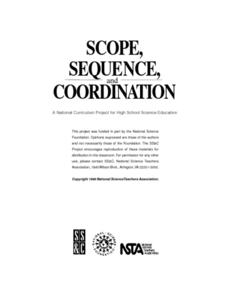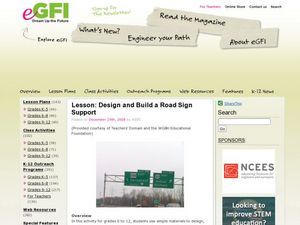American Battlefield Trust
The Gathering Storm: The Coming of the Civil War
Slavery or states' rights: What really started the American Civil War? A lesson geared towards middle schoolers explores the causes of the Civil War. Scholars view an interactive of the Gathering Storm exhibit online and complete a...
American Museum of Natural History
What is Astronomy?
Go study the universe. Pupils learn seven aspects about astronomy and astronomers. They begin to learn about constellations; distance and motion between objects; gravity; the electromagnetic spectrum; dark matter and energy; and teams of...
Teaching Tolerance
Critiquing Hate Crimes Legislation
The high school lesson explores what hate crimes are and how the government has responded to those crimes. Academics read legislation, analyze political cartoons, and complete hands-on-activities to understand what motivates individuals...
Teaching Tolerance
Parallels Between Mass Incarceration and Jim Crow
Is history repeating itself? A riveting lesson examines the parallels between mass incarceration in the U.S. and the Jim Crow Laws of the past. Academics review Jim Crow Laws and compare them to mass incarcerations of African Americans....
Center for History Education
Helping to Move On? An Analysis of the Reconstruction Amendments
Reconstruction amendments: a helping hand or another form of slavery? An inquisitive lesson compares the Reconstruction legislation that ended slavery, granted citizenship, and protected voting right for African American men. Scholars...
University of California
Bread and Circuses: Rome as a Site of Encounter
An intriguing lesson uses 12 Roman artifacts to explain Roman society and politics. Young historians view images of artifacts and learn how each one represents an aspect of Roman society. Academics also complete a hands-on activity to...
Curated OER
Active and Passive Voice: Finding Examples Online
Incorporate technological fluency with a search for examples of active and passive voice in online resources. Discuss how use of active or passive voice influences mood or tone and contributes to author's purpose. List of...
Curated OER
Active/Passive Voice Recognition Practice
Practice the active and the passive voice with this worksheet. Print this sheet for your class, and they can practice identifying the verb and deciding whether the verb is in the active or passive tense.
Curated OER
Look on the Bright Side!
Students explore solar eclipses by participating in a number of hands-on activities. In class, students work in teams using tennis balls, grapes and flashlights to model partial and total solar eclipses.
Curated OER
The Power of a Project
How does PBL differ from a basic thematic unit? Discover the answer to this important question. A bulleted comparison is made between each type of teaching method, example projects are included, and a full "how to" is laid out in an easy...
Scholastic
A Reading Guide to A Wrinkle in Time
Accompany a reading of Madeleine L'Engle's classic tale, A Wrinkle in Time, with a detailed guide equipped with 15 informative and useful chapters. Scholars discover who the author is, why she wrote the book, and crucial story elements...
Curated OER
You Gotta Have Heart: Congenital Heart Defects and Heart Surgery
Assess anatomists' understanding of the structure of the mammalian heart by giving a pretest. Have them visit some websites to further learn about heart anatomy. Then take them into the laboratory to perform a dissection so that they get...
Curated OER
Electric Charge and Static Electricity
Begin with the classic static electricity demonstrations: the behavior of charged balloons and metal leaves of an electroscope. Then move on to test the electrical conductivity of various materials. Give physics pupils a charge with...
eGFI
Design and Build a Road Sign Support
Emergent engineers plan, construct, and experiment with a spaghetti noodle structure that could hold a load. Set them up for success by first showing them a four-minute video on engineering design and a slide show of different signposts....
Science Matters
Thermal Energy Flow in Materials
The sun sends the earth 35,000 times the amount of energy required by all of us on the entire planet, every day. The fourth lesson in the 10-part series looks at how light energy from the sun transfers into thermal energy. Scholars build...
Curated OER
Levers and Wedges in the Human Body
Young biologists identify parts of the body that serve as wedges (teeth and fingernails), and as levers (jaw, arms, and legs). The hands-on activities described here should be exciting for learners to perform, and should also lead to a...
Curated OER
Healthy Snacks Project Lesson
After learning why it is important to limit salt, fat, and sugar in their diets, divide your class into pairs or groups to complete this project. Each group will create two charts: unhealthy and healthy foods. They will cut out food...
Howard Hughes Medical Institute
The Making of the Fittest: Natural Selection and Adaptation
The pocket mouse can be light brown like the sands of the desert, or dark brown like the volcanic lava flows that are interspersed throughout New Mexico's Valley of Fire. It seems that predators have weeded out light colored mice in this...
Twiggle Magazine
Preschool Color Fun and Activities
I can't stress enough the importance of songs and rhyming chants to the development of early literacy skills. To reinforce color recognition, little ones sing, count, move, and create. All you have to do is choose which of these great...
Howard Hughes Medical Institute
What van Leeuwenhoek Saw
When van Leeuwenhoek saw cells and single-celled organisms for the first time, he knew these small things were a big deal! Share his discoveries with young learners through a narrated video, model-building activity, and scale study....
Teach Engineering
Stop the Stretching
Stretch your teaching repertoire with an experiment on the elongation (stretching) and failure (break) of several materials. The point of the experiment is to design a composite material for chair webbing.
Curated OER
With Your Own Two Hands: Are You Changing the World or "Waiting for the World to Change"?
Can your pupils change the world? Explore this question with Ben Harper's song "With My Own Two Hands" and John Mayer's "Waiting for the World to Change." After listening to the songs, they discuss the tools at their disposal for...
Curated OER
Introduce Vocabulary: Clap Your Hands (Cauley)
Lorinda Cauley's book Clap Your Hands is a fun way to expand budding readers' vocabulary in context (although you could use any book for this strategy). To prepare kids, introduce the following terms before reading: dare, flap, frown,...
American Chemical Society
Isolation of Phytochrome
Why do soybean plants that are planted weeks apart in the spring mature simultaneously in the fall? Four independent activities cover the history of phytochrome research, scientist collaboration, the electromagnetic spectrum, and...
Other popular searches
- Reptiles Hands on Activities
- Hands on Activities Cells
- Grammar Hands on Activities
- Math Hands on Activities
- Mitosis Hands on Activities
- Hands on Activities of Heat
- Hands on Activities Dna
- Hands on Activities Respect
- Animal Hands on Activities
- Blending Hands on Activities
- Hands on Activities Patterns
- Hands on Activities Dna Rna

























